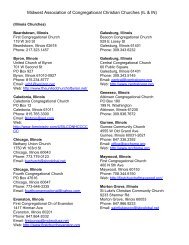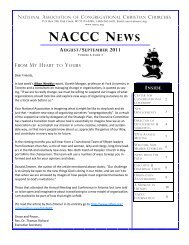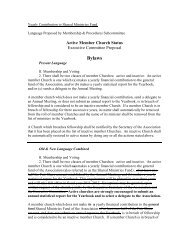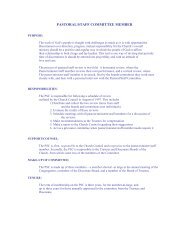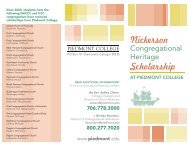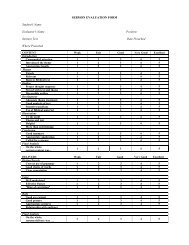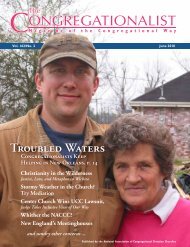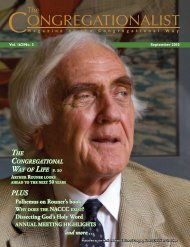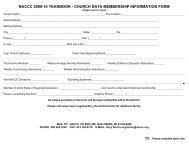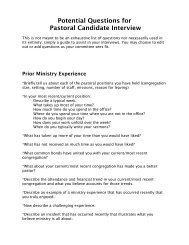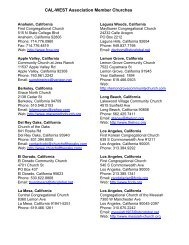8473 South Howell Avenue Oak Creek, WI 53154-0288 - National ...
8473 South Howell Avenue Oak Creek, WI 53154-0288 - National ...
8473 South Howell Avenue Oak Creek, WI 53154-0288 - National ...
Create successful ePaper yourself
Turn your PDF publications into a flip-book with our unique Google optimized e-Paper software.
Browne, wanted their traditional English service from the Book of Common Prayer3 .<br />
But that was not to be. Endicott and the two ministers, the Revs. Samuel Skelton and<br />
Francis Higginson, after conferring with the only Englishmen of any consequence<br />
around at that time, the “first comers” (i.e., the Pilgrims), decided that the way they<br />
worshiped in Plimoth, was the way they would do it in Naumkeag.<br />
The Pilgrims were the remnants of the Leyden church of John Robinson, a<br />
former devotee of Separatist Robert Browne. Over the course of forty years in<br />
England and Holland, Robinson mellowed his once similar opinions, yet still<br />
advocated a gathered covenanted church, separated from “the dross,” whose<br />
members elected and ordained their own ministers.<br />
Endicott agreed and called for “a solemne day of humiliation, for the choyce of a<br />
pastor & teacher.” A minority of the settlement’s 200 residents met and chose the<br />
Revs. Skelton and Higginson, by paper ballot, as pastor and teacher respectively;<br />
the famous Salem Covenant of 1629 4 was drawn up about this same time. Thus a<br />
fledgling Congregational church was born with drastic changes in polity and liturgy<br />
from their mother church back home. The bishops and the Book of Common Prayer<br />
were out, and the Browne brothers were sent back to England against their will.<br />
The brothers petitioned the officers of the Massachusetts Bay Company back in<br />
London to hear their case. They had put a lot of money into the Bay Company and<br />
wanted redress for their losses. Their choice of representation was telling: William<br />
Vassall, his brother Samuel, and William Pyncheon 5 . All three men would eventually<br />
end up on the wrong side of the Puritan elite. At a London meeting on Sept. 29, 1629,<br />
a meeting William Vassall did not attend, the private letters of the two brothers were<br />
opened and it was decided that “none of the letters from Mr. Sam Browne shall be<br />
delivered, but kept to be made use of against him as occasion shall be offered.” 6<br />
Opening letters of potential troublemakers was common practice, first in London and<br />
later in Boston. Leaders of the Massachusetts Bay Company wanted no negative press<br />
about the new colony they were preparing to launch the next spring. Eleven ships had<br />
already been purchased and decked out to carry 700 passengers to Salem. They especially<br />
endicott and the two ministers … decided that the way they<br />
worshiped in plimoth, was the way they would do it in naumkeag.<br />
didn’t want the king thinking that Massachusetts was becoming a nest of Separatists.<br />
William Vassall sailed to New England with his family April 7, 1630, perhaps on<br />
the Arbella itself, arriving June 12 in Salem. Much to everyone’s horror they found<br />
the fledgling colony under Endicott running out of food and negligent in planting<br />
crops. With Salem ill-prepared to take care of itself, let alone 700 new settlers,<br />
more than 100 destitute and starving Englishmen decided to return home with the<br />
departing ships. On one of them—the Lyon, which Winthrop sent back to Bristol<br />
for emergency supplies as early as July 23—sailed William Vassall and his family,<br />
a most unusual turn of events for one who had pledged his wealth and support to<br />
the company the summer before. 7<br />
One wonders if it was the disease, the starvation, and the dilapidated village they found<br />
there—in themselves plausible reasons for taking a young family back to England. But<br />
gradually unfolding events suggest another motive, even more compelling.<br />
The influential Rev. John Cotton (1585-1652),<br />
who would soon emigrate to New England<br />
himself, wrote from Lincolnshire to assure the<br />
Rev. Samuel Skelton that the Church of England<br />
was in fact a Reformed church and its members<br />
worthy to receive the Lord's Supper.<br />
The determined John Endicott sought to impose<br />
a Separatist vision of church life on the new<br />
Massachusetts Bay Colony.<br />
3 Charles Andrews, The Colonial Period of American History Vol. 1 (Yale Univ. Press, 1934), 370.<br />
4 “We Covenant with the Lord and one with an other; and doe bynd our selves in the presence of God, to walke together in all his waies, according as he is pleased<br />
to reveale himself unto us in his Blessed word of truth.”<br />
5 Alexander Young, ed., Chronicles of the First Planters of the Colony of Massachusetts Bay from 1623-1636 (Boston: Charles C. Little and James Brown, 1846<br />
6 Ibid., 92.<br />
7 “John Winthrop to J. Winthrop, Jr.,” Winthrop Papers Vol. 2 1623-1630, (Massachusetts Historical Society: Plimpton Press, 1931), 305.<br />
Continued g<br />
7<br />
Courtesy of StanKlos.com



